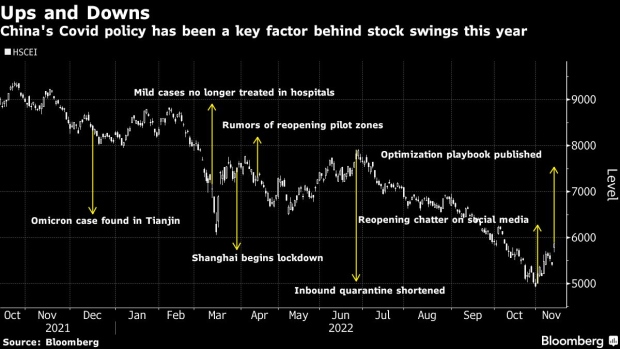Nov 11, 2022
FOMO Grips China Traders in World’s Wildest Stock Market
, Bloomberg News

(Bloomberg) -- The world’s most gut-wrenching stock market reversal is becoming even more extreme as traders bet China’s Covid Zero easing campaign has further to run.
Frenzied trading amid a fear of missing out on a rally has sent one measure of volatility in a key China stock gauge to the highest in the world, following weeks of turbulence that saw Xi Jinping’s show of power at the October party congress and a spate of lockdowns amid rising Covid cases. Sparking optimism, authorities on Friday cut quarantine periods and scrapped flight bans in a pivotal shift, helping the Hang Seng China Enterprises Index cap its best two-week gain in more than seven years.
Traders are latching on to even the smallest signs of relaxations that could spur a long-term rally, after the restrictions crushed growth in the world’s second-largest economy. For investors, stakes are high in a market that’s known for prolonged periods of choppy trading followed by huge surges in short spans of time, like in the wake of the global financial crisis. Missing out on such gains could be costly.
“As we get closer to the year-end, this volatility is likely to remain in place though there’s a genuine shift in tone from the Chinese government with respect to Covid,” said Sat Duhra, a portfolio manager at Janus Henderson Investors. There also “appears to be a real sense of ‘FOMO’ with respect to a China rebound among Asian investors,” he added.
The volatility is evident in Friday’s trading, with the Hang Seng Index posting its biggest one-day gain since March and US-listed Chinese stocks rallying across the board. Shares of Chinese property developers saw double-digit gains as Beijing ramped up financial aid, including $56 billion in new funding to the ailing sector, according to a Bloomberg News report.
Some brokerages are seeing a jump in account openings and margin lending. Saxo Capital Markets said margin lending in Hong Kong stocks doubled in the first week of November from the previous period. Bright Smart Securities, one of the largest brokers in Hong Kong, saw a 25% increase in account openings at the start of this week.
Options data also point to a more bullish tone. Average volumes for call options on the Hang Seng China Enterprises Index outnumbered put options by about a third over the past 20 days, according to Bloomberg-compiled data. On Friday, one of the most actively traded contracts on the gauge was a call option expiring March 30, betting on a rise of about 36% from Friday’s close.
A mix of short covering and buying of beaten-down reopening, tech and property shares contributed to the stock volatility, with the Hang Seng China Index’s 10-day realized swings atop global benchmarks. The yuan has also swung violently from one end of its tightly managed trading band to the other like never before as pessimism turns into optimism.
The advance made Hong Kong’s gauges the world’s top performers this month after being the worst for most of the year. The Hang Seng China Index has rebounded 19% from an October low, trimming this year’s losses to 29%, although it’s still one of the top losers among the 92 global benchmarks tracked by Bloomberg.
Valuations and low positioning are being cited as key reasons to buy, even as investors remain cautious of false dawns. Hong Kong’s benchmark Hang Seng Index is trading close to its lowest price-to-book ratio on record, while mainland’s CSI 300 Index is near its lowest forward price-to-earnings multiple since the early days of the pandemic.
Active fund managers are finding it particularly tough to stay on the sidelines, which may make them vulnerable to underperformance versus benchmarks after they sold a lot of their holdings over the past two years. China and Hong Kong together account for about a fifth of the MSCI Asia Pacific Index’s weighting.
“In a potential year-end rally, many investors may see pressure to reduce their underweight positions, which makes the rally self-reinforcing,” said Winnie Wu, China equity strategist at BofA Securities. She said about 60% of investors surveyed by BofA at their recent China conference said that “reopening” was the most important factor for them to turn “more positive” on China.
BNP Paribas’ Energy Transition fund bought Chinese electric vehicle and battery stocks on “attractive” valuations after the post-party congress declines, co-manager Edward Lees said in an interview. The fund has doubled its China exposure from the start of the year.
READ: Tiger Global Joins China Exodus as Market Swings Turn Extreme
To be sure, a resurgence in Covid cases in some parts of the country is tempering expectations for big changes to the Covid Zero policy. With China still offering no steer on when it will end Covid Zero altogether, it’s likely that volatility is here to stay.
“We are not ready to pound the table on China stocks and we think it’ll remain volatile in the near term,” said Xin-Yao Ng, investment manager of Asian equities at abrdn plc. But “there are risks to betting too heavily against China at this point.”
--With assistance from Abhishek Vishnoi, John Cheng, April Ma and Henry Ren.
(Updates to add details of Friday’s trading and report of China’s property sector support in fifth paragraph)
©2022 Bloomberg L.P.






